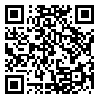

Volume 25, Issue 1 (Winter 2019)
Intern Med Today 2019, 25(1): 37-42 |
Back to browse issues page
Download citation:
BibTeX | RIS | EndNote | Medlars | ProCite | Reference Manager | RefWorks
Send citation to:



BibTeX | RIS | EndNote | Medlars | ProCite | Reference Manager | RefWorks
Send citation to:
Hairaty K, Sadeghmoghadam L, Alami A, Moshki M. Effect of Education Based on Health Locus of Control Theory on Health Literacy among Older Adult. Intern Med Today 2019; 25 (1) :37-42
URL: http://imtj.gmu.ac.ir/article-1-2859-en.html
URL: http://imtj.gmu.ac.ir/article-1-2859-en.html
1- Research Committee Student; Department of Health Education and Health Promotion, Gonabad University of Medical Sciences, Gonabad, Iran
2- Social Development & Health Promotion Research Center; Department of Nursing, School of Nursing, Gonabad University of Medical Science, Gonabad, Iran.
3- Social Determinants of Health Research Center; Department of Health, School of Public Health, Gonabad University of Medical Sciences, Gonabad, Iran. ,alialami65@hotmail.com
4- Social Development & Health Promotion Research Center; Department of Health Education and Health Promotion, School of Health, Gonabad University of Medical Sciences, Gonabad, Iran.
2- Social Development & Health Promotion Research Center; Department of Nursing, School of Nursing, Gonabad University of Medical Science, Gonabad, Iran.
3- Social Determinants of Health Research Center; Department of Health, School of Public Health, Gonabad University of Medical Sciences, Gonabad, Iran. ,
4- Social Development & Health Promotion Research Center; Department of Health Education and Health Promotion, School of Health, Gonabad University of Medical Sciences, Gonabad, Iran.
Abstract: (6173 Views)
Aims: Health literacy is one of the most important variables in maintaining and improving the health of all, especially among elderly people. In addition the Health Locus of Control (HLC) theory, is considered as one of the tools which used in planning health education programs. The aim of this study was to determine the effect of education based on the Health Locus of Control (HLC) theory on health literacy among elderly persons.
Materials & Methods: A parallel, randomized field trial study conducted among seniors 60 to 75 years, residents in Bardaskan in 2017. Using balanced block randomization, the participants were randomly allocated into intervention and control group. The required data were gathered by adult health literacy and HLC questionnaires. The data were entered in SPSS 21 software and were analyzed using and T-test (independent, paired).
and T-test (independent, paired).
Findings: We used data from 91 completed questionnaires (intervention group= 46, control group = 45) to perform the analysis. Before intervention, the mean and standard deviation of health literacy in experimental and control group were 52.60 (11.95) and 48.07 (12.54), respectively (P= 0.080). These amounts were 77.68 (7.60) in intervention group and 51.18 (13.99) in control group after the intervention (p<0.001).
Conclusion: The results indicated that educational intervention based on the theory of health locus of control could affect the health literacy of elderly. By recognizing health control beliefs of elderly people, it seems that appropriate educational programs can be developed to educate and develop health literacy of this group.
Materials & Methods: A parallel, randomized field trial study conducted among seniors 60 to 75 years, residents in Bardaskan in 2017. Using balanced block randomization, the participants were randomly allocated into intervention and control group. The required data were gathered by adult health literacy and HLC questionnaires. The data were entered in SPSS 21 software and were analyzed using
Findings: We used data from 91 completed questionnaires (intervention group= 46, control group = 45) to perform the analysis. Before intervention, the mean and standard deviation of health literacy in experimental and control group were 52.60 (11.95) and 48.07 (12.54), respectively (P= 0.080). These amounts were 77.68 (7.60) in intervention group and 51.18 (13.99) in control group after the intervention (p<0.001).
Conclusion: The results indicated that educational intervention based on the theory of health locus of control could affect the health literacy of elderly. By recognizing health control beliefs of elderly people, it seems that appropriate educational programs can be developed to educate and develop health literacy of this group.
Keywords: Aged: [https://www.ncbi.nlm.nih.gov/mesh/68000368], Education:[https://www.ncbi.nlm.nih.gov/mesh/68004493], Internal-External Control: [https://www.ncbi.nlm.nih.gov/mesh/?term=Locus+of+Control], Health Literacy: [https://www.ncbi.nlm.nih.gov/mesh/?term
Type of Study: Applicable |
Subject:
Basic Medical Science
Received: 2017/09/25 | Accepted: 2018/12/17 | Published: 2018/12/22
Received: 2017/09/25 | Accepted: 2018/12/17 | Published: 2018/12/22
English Expanded Abstract [HTML 21 KB] (260 Download)
| Rights and permissions | |
 |
This work is licensed under a Creative Commons Attribution-NonCommercial 4.0 International License. |



